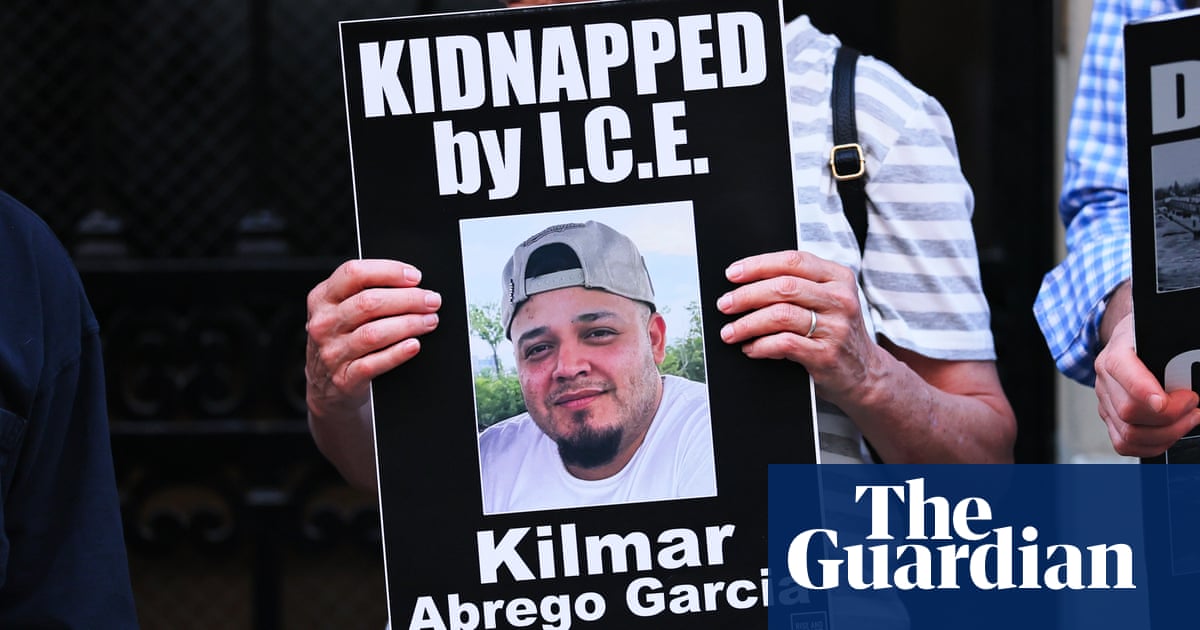Kilmar Ábrego García, the man whom the Donald Trump administration mistakenly deported from Maryland to El Salvador in March, returned to the US on Friday to face criminal charges.
In a press briefing on Friday, the US attorney general, Pam Bondi, said that a federal grand jury in Tennessee hadindictedthe 29-year-old father on counts of illegally smuggling undocumented people as well as of conspiracy to commit that crime.
“Our government presented El Salvador with an arrest warrant and they agreed to return him to our country,” Bondi said of Ábrego García. She thanked Salvadorian president, Nayib Bukele, “for agreeing to return him to our country to face these very serious charges”.
“This is what American justice looks like upon completion of his sentence,” Bondi added.
In astatementto the Hill on Friday, Ábrego García’s lawyer Simon Sandoval-Moshenberg accused the Trump administration of having “disappeared” his client “to a foreign prison in violation of a court order”.
“Now, after months of delay and secrecy, they’re bringing him back, not to correct their error but to prosecute him,” he added.
Sandoval-Moshenberg also said: “This shows that they were playing games with the court all along. Due process means the chance to defend yourself before you’re punished – not after.”
Sandoval-Moshenberg said the White House’s treatment of his client was “an abuse of power, not justice”. He called on Ábrego García to face the same immigration judge who had previouslygrantedhim a federal protection order against deportation to El Salvador “to ensure that his case is handled as it would have been had he not been improperly sent” there.
That, Sandoval-Moshenberg argued, “is the ordinary manner of doing things” – and he said that is what the US supreme court had ordered in April.
Bondi on Friday maintained that federal grand jurors found that Ábrego García “has played a significant role” in an abusive smuggling ring that had operated for nearly a decade.
The attorney general added that if convicted, Ábrego García would be deported to El Salvador after completing his sentence in the US.
Ábrego García entered the US without permission in about 2011 while fleeing gang violence in El Salvador.
Despite the judicial order meant to prevent his deportation to El Salvador, on 15 March, US Immigration and Customs Enforcement (Ice) officials deported him to El Salvador after arresting him in Maryland.
He was held in the so-called Center for Terrorism Confinement, acontroversial mega-prisonbetter known as Cecot.
The Trump administration subsequently admitted that Ábrego García’s deportation was an“administrative error”. But it has repeatedly cast him as a MS-13 gang member on television – a claim which his wife, a US citizen, and his attorneys staunchly reject.
Ábrego García also had no criminal record in the US before the indictment announced on Friday,according tocourt documents.
On 4 April, federal judge Paula Xinis ordered the Trump administration to “facilitate and effectuate” Ábrego García’s return from El Salvador after his family filed a lawsuit in response to his deportation.
The supreme court unanimously upheld Xinis’s order a week later. In an unsigned decision, the court said that Xinis’s decision “properly requires the government to ‘facilitate’ Ábrego García’s release from custody in El Salvador and to ensure that his case is handled as it would have been had he not been improperly sent to El Salvador”.
A Friday statement from US senator Chris Van Hollen of Maryland said theTrump administrationhad “finally relented” to his demand to afford Ábrego due process.
“This is not about the man,” said Van Hollen, who visited Ábrego in El Salvador in April. “It’s about his constitutional rights – and the rights of all.”
Bukele wrote on X, in part, that he would not refuse the Trump administration’s request for “the return of a gang member to face charges”.
